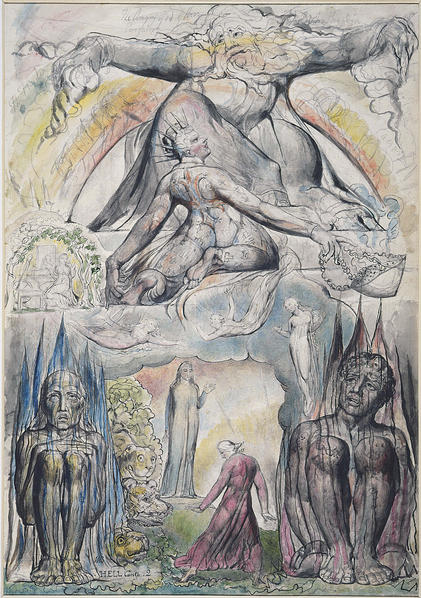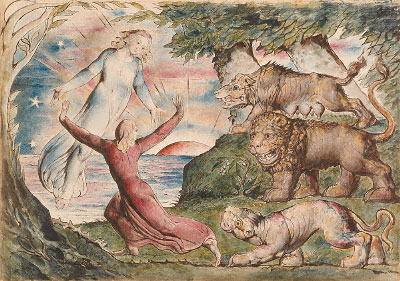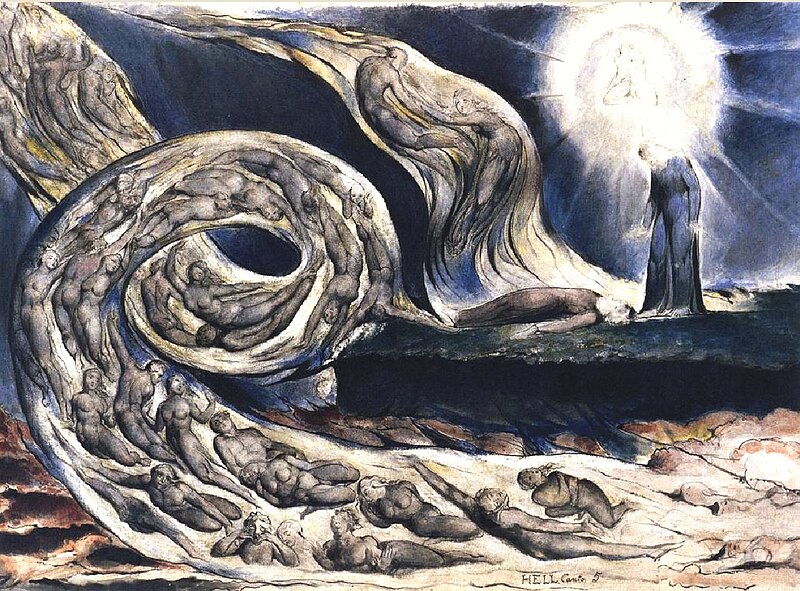 |
| English: William Blake - John Bunyan Plate 20 The Christian Fights Apollyon |
{141} Then I saw in my dream that these good companions, when
Christian was gone to the bottom of the hill, gave him a loaf of
bread, a bottle of wine, and a cluster of raisins; and then he went
on his way.
But now, in this Valley of Humiliation, poor Christian was hard put
to it; for he had gone but a little way, before he espied a foul
fiend coming over the field to meet him; his name is Apollyon. Then
did Christian begin to be afraid, and to cast in his mind whether
to go back or to stand his ground. But he considered again that
he had no armour for his back; and therefore thought that to turn
the back to him might give him the greater advantage with ease to
pierce him with his darts.
Christian's resolution at the approach of Apollyon
Therefore he resolved to venture and stand his ground; for, thought
he, had I no more in mine eye than the saving of my life, it would
be the best way to stand.
{142} So he went on, and Apollyon met him. Now the monster was
hideous to behold; he was clothed with scales, like a fish, (and
they are his pride,) he had wings like a dragon, feet like a bear,
and out of his belly came fire and smoke, and his mouth was as the
mouth of a lion. When he was come up to Christian, he beheld him
with a disdainful countenance, and thus began to question with him.
{143} APOL. Whence come you? and whither are you bound?
CHR. I am come from the City of Destruction, which is the place of
all evil, and am going to the City of Zion.
APOL. By this I perceive thou art one of my subjects, for all that
country is mine, and I am the prince and god of it. How is it,
then, that thou hast run away from thy king? Were it not that I
hope thou mayest do me more service, I would strike thee now, at
one blow, to the ground.
{144} CHR. I was born, indeed, in your dominions, but your service
was hard, and your wages such as a man could not live on, "for the
wages of sin is death" [Rom 6:23]; therefore, when I was come to
years, I did, as other considerate persons do, look out, if, perhaps,
I might mend myself.
Apollyon's flattery
APOL. There is no prince that will thus lightly lose his subjects,
neither will I as yet lose thee; but since thou complainest of thy
service and wages, be content to go back: what our country will
afford, I do here promise to give thee.
CHR. But I have let myself to another, even to the King of princes;
and how can I, with fairness, go back with thee?
{145} APOL. Thou hast done in this, according to the proverb,
"Changed a bad for a worse"; but it is ordinary for those that
have professed themselves his servants, after a while to give him
the slip, and return again to me. Do thou so too, and all shall
be well.
CHR. I have given him my faith, and sworn my allegiance to him;
how, then, can I go back from this, and not be hanged as a traitor?
APOL. Thou didst the same to me, and yet I am willing to pass by
all, if now thou wilt yet turn again and go back.
{146} CHR. What I promised thee was in my nonage; and, besides, I
count the Prince under whose banner now I stand is able to absolve
me; yea, and to pardon also what I did as to my compliance with
thee; and besides, O thou destroying Apollyon! to speak truth,
I like his service, his wages, his servants, his government, his
company, and country, better than thine; and, therefore, leave off
to persuade me further; I am his servant, and I will follow him.
{147} APOL. Consider, again, when thou art in cool blood, what thou
art like to meet with in the way that thou goest. Thou knowest
that, for the most part, his servants come to an ill end, because
they are transgressors against me and my ways. How many of them
have been put to shameful deaths! and, besides, thou countest his
service better than mine, whereas he never came yet from the place
where he is to deliver any that served him out of their hands; but
as for me, how many times, as all the world very well knows, have
I delivered, either by power, or fraud, those that have faithfully
served me, from him and his, though taken by them; and so I will
deliver thee.
CHR. His forbearing at present to deliver them is on purpose to try
their love, whether they will cleave to him to the end; and as for
the ill end thou sayest they come to, that is most glorious in their
account; for, for present deliverance, they do not much expect it,
for they stay for their glory, and then they shall have it when
their Prince comes in his and the glory of the angels.
APOL. Thou hast already been unfaithful in thy service to him; and
how dost thou think to receive wages of him?
CHR. Wherein, O Apollyon! have I been unfaithful to him?
{148} APOL. Thou didst faint at first setting out, when thou wast
almost choked in the Gulf of Despond; thou didst attempt wrong ways
to be rid of thy burden, whereas thou shouldst have stayed till
thy Prince had taken it off; thou didst sinfully sleep and lose
thy choice thing; thou wast, also, almost persuaded to go back at
the sight of the lions; and when thou talkest of thy journey, and
of what thou hast heard and seen, thou art inwardly desirous of
vain-glory in all that thou sayest or doest.
CHR. All this is true, and much more which thou hast left out;
but the Prince whom I serve and honour is merciful, and ready to
forgive; but, besides, these infirmities possessed me in thy country,
for there I sucked them in; and I have groaned under them, been
sorry for them, and have obtained pardon of my Prince.
{149} APOL. Then Apollyon broke out into a grievous rage, saying,
I am an enemy to this Prince; I hate his person, his laws, and
people; I am come out on purpose to withstand thee.
CHR. Apollyon, beware what you do; for I am in the King's highway,
the way of holiness; therefore take heed to yourself.
APOL. Then Apollyon straddled quite over the whole breadth of the
way, and said, I am void of fear in this matter: prepare thyself
to die; for I swear by my infernal den, that thou shalt go no
further; here will I spill thy soul.
{150} And with that he threw a flaming dart at his breast; but
Christian had a shield in his hand, with which he caught it, and
so prevented the danger of that.
Then did Christian draw, for he saw it was time to bestir him; and
Apollyon as fast made at him, throwing darts as thick as hail; by
the which, notwithstanding all that Christian could do to avoid it,
Apollyon wounded him in his head, his hand, and foot. This made
Christian give a little back; Apollyon, therefore, followed his work
amain, and Christian again took courage, and resisted as manfully
as he could. This sore combat lasted for above half a day, even
till Christian was almost quite spent; for you must know that
Christian, by reason of his wounds, must needs grow weaker and
weaker.
{151} Then Apollyon, espying his opportunity, began to gather up
close to Christian, and wrestling with him, gave him a dreadful
fall; and with that Christian's sword flew out of his hand. Then
said Apollyon, I am sure of thee now. And with that he had almost
pressed him to death, so that Christian began to despair of life;
but as God would have it, while Apollyon was fetching of his
last blow, thereby to make a full end of this good man, Christian
nimbly stretched out his hand for his sword, and caught it, saying,
"Rejoice not against me, O mine enemy; when I fall I shall arise"
[Micah 7:8];
Christian's victory over Apollyon
and with that gave him a deadly thrust, which made him give back,
as one that had received his mortal wound. Christian perceiving
that, made at him again, saying, "Nay, in all these things we are
more than conquerors through him that loved us". [Rom. 8:37] And
with that Apollyon spread forth his dragon's wings, and sped him
away, that Christian for a season saw him no more. [James 4:7]
{152} In this combat no man can imagine, unless he had seen and
heard as I did, what yelling and hideous roaring Apollyon made all
the time of the fight--he spake like a dragon; and, on the other
side, what sighs and groans burst from Christian's heart. I never
saw him all the while give so much as one pleasant look, till he
perceived he had wounded Apollyon with his two-edged sword; then,
indeed, he did smile, and look upward; but it was the dreadfullest
sight that ever I saw.
A more unequal match can hardly be,--CHRISTIAN must fight an
Angel; but you see,
The valiant man by handling Sword and Shield,
Doth make him, tho' a Dragon, quit the field.
{153} So when the battle was over, Christian said, "I will here
give thanks to him that delivered me out of the mouth of the lion,
to him that did help me against Apollyon."
From Wikipedia, the free encyclopedia
http://upload.wikimedia.org/wikipedia/commons/3/3e/Christianandapollyon.jpg
The Hebrew Abaddon (Hebrew: אֲבַדּוֹן, 'Ǎḇaddōn), and its Greek equivalent Apollyon (Greek:Ἀπολλύων, Apollyon), appears in the Bible as both, a place of destruction, and as the name of anangel. In the Hebrew Bible, abaddon is used with reference to a bottomless pit, often appearing alongside the place שאול (sheol), meaning the realm of the dead. In the New Testament Book of Revelation, an angel called Abaddon is described as the king of an army of locusts; his name is first transcribed in Greek (Revelation 9:11—"whose name in Hebrew is Abaddon" (Ἀβαδδὼν)), and then translated ("which in Greek means the Destroyer" (Ἀπολλύων, Apollyon)). The Latin Vulgate and theDouay Rheims Bible have additional notes (not present in the Greek text), "in Latin Exterminans",exterminans being the Latin word for "destroyer".
-
http://upload.wikimedia.org/wikipedia/commons/3/3e/Christianandapollyon.jpg














